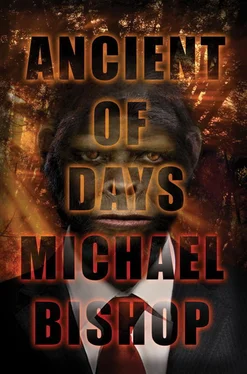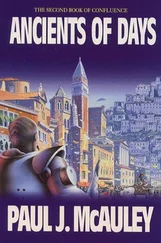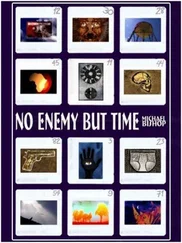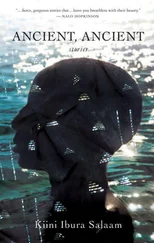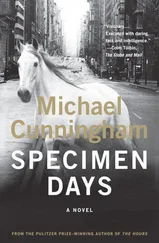RuthClaire’s eyes narrowed. “Are you trying to say that this is the second?”
Nollinger was not an utter idiot. His face turned red. “N-no, of course not. It’s just that… well, w-w-we’re all primates, you know. The impulse for self-expression may be b-basic to every primate species.”
Abruptly, Adam turned and climbed the wrought-iron ladder into the gallery loft. Once there, he squatted in the shadows like a lissome Quasimodo.
“Go away, please,” RuthClaire said.
“Wait a minute,” Nollinger said. “This is a public exhibit. You can’t run me off.”
“Have you seen the photographic exhibit?” I asked. Mindful of the time I had hit him, he took a step backward. “You’ll like ’em. Each and every one of them is an insult to people of taste and intelligence.”
“I’m trying to talk to the Montarazes.”
“You’re going into the Kander exhibit.” I turned Nollinger around and headed him toward Gallery Two. He tried to yank away, but I applied a bouncer hold and marched him out.
Fear of creating a scene prevented Nollinger from resisting me further. I took advantage of that scruple—at least he had one —to deposit him in front of a photograph of an American Plains Indian with an empty fifth of Wild Turkey in one hand and the blonde scalp of a white girl-woman in the other. This comatose nymphet wore only a black-lace teddy and lay prostrate at the chief’s feet.
“Here,” I said: “Another fascinating instance of the primate creative impulse.”
This photo, and the others around it, mesmerized Brian Nollinger, and I left him there in the crowded gallery room.
David Blau helped us escape Abraxas without running a gauntlet of reporters. We used an auxiliary stairwell to get away, emerging in the parking lot to find that it had stopped raining. Water glistened on the asphalt. The trees dripped diamonds. In one patch of sky, a few fretful stars struggled to blink aside the cloud cover.
We drove to Patrick’s, a restaurant in Little Five Points, and asked for a table away from the long storefront windows facing Moreland Avenue. Here we ordered more white wine, with a fresh spinach salad and a breast-of-chicken entrée. Because Nollinger had rained on Adam’s parade, we had a hard time sustaining conversation.
“Consider the source and forget it,” I told Adam. “Your opening was packed. How often does that happen?”
“Rarely,” RuthClaire said. “Not often at all.”
“There, you see? It’s a triumph, Adam. Forget about that guy’s fatuous faux pas.”
Adam wiped his fingers on a linen napkin. Leaning back in his chair, he signed gracefully in the candle-lit dining room. Adam (according to RuthClaire’s translation) did not regard the turnout at Abraxas as a personal triumph. At least half the people there had taken advantage of the respectability implicit in a gallery opening to ogle Kander’s photos. The most knowledgeable and devoted gallery patrons, Adam went on, had come for the Haitian exhibit. Those who had come to see his paintings (people like Nollinger, for instance) were motivated less by faith in the potential importance of Adam’s work than by curiosity. What sort of Rorschach blotches would a living hominid anachronism put to canvas?
Half of Adam’s meal remained untouched. RuthClaire gripped him fondly on one side of his neck and massaged the taut sinews with a gentle hand. He closed his eyes, enduring this display of affection as if unworthy of it. Once upon a time, I knew, I would have killed to experience such tenderness at RuthClaire’s hands. Once upon a time ? From my jacket I removed the letters that the Montarazes had sent me in December. I shook out Adam’s and tilted it in the candle glow so that I could read it.
“ ‘One day this year Miss RuthClaire may ask you to come see about her seeing about me. Some doctors at Emory are plotting now a surgery to humanize me for this time and place. Do please come when she asks . ’” Gallantly, I did not read the parts offering to reimburse me for my time and authorizing his wife and me to use the same bed if we both agreed to the “niceness” of that arrangement. “Any comments?”
“What do you want to know?” RuthClaire finally asked.
“What kind of surgery? When’s it supposed to happen? When will you need me? Why so secretive?”
“You’ll come?”
“I’ve already said so.”
RuthClaire looked at Adam. He nodded a curt okay. “This summer,” she said. “It’s exacting plastic surgery. The point is to enable Adam to speak. It involves reshaping the entire buccal cavity—without deforming his facial features.” She gave Adam a smile. “Hey, fella, I love that face.” To me, she said, “There’s work to be done on his vocal cords and larynx, too. Don’t ask me to explain it all. It’s already required several X-ray sessions, some plaster castings, and more psycho-medical sessions than you’d expect a candidate for a sex change to sit through.”
“Adam’s going to be able to talk?” I turned my hand into a gibbering puppet.
“That’s the basic idea.”
I sat back in my chair. This particular basic idea had never occurred to me. Adam an orator? Picturing him talking—like Brad Barrington or Dwight “Happy” McElroy—unnerved me. What impact would the ability have on him? On others? Would my acceptance of him—my commitment to him as a friend —diminish as he asserted his own personality and opinions through the medium of direct speech? Did my regard for Adam have its source in heretofore disguised feelings of superiority?
“What’s the matter, Paul?”
“How much is this going to cost?”
“Lots.”
“That’s what I figured.”
“For something this crucial, we’ve got it to spend.” She eyed me shrewdly. “You don’t approve?”
“It sounds great. Adam and I will be able to commiserate about the weather.”
What was wrong with me? I’d accepted so much else about Adam—his marriage to RuthClaire, his biological compatibility with my former wife, his developing literacy, and even the half-pathetic sincerity of his spiritual yearnings. Why couldn’t I accept his desire to talk? To put my selfish reluctance in the best possible light, maybe I had a faint intimation of all the trouble looming ahead for us.
RuthClaire paid the bill, but I insisted on leaving the tip.
We returned in my car to the sprawling Montaraz bordello-cum-boarding house on Hurt Street. It was too late to play with Tiny Paul, but when we looked in on him sleeping in his bassinet, I was startled to see his dreaming features betray a hint of the feral self-sufficiency that only a moment ago, leaving Patrick’s, I had seen in his father’s face. All babies have something endearingly pongid about them, but there in the sheen of his night light my godson’s resemblance to a “collateral primate”—a baby gorilla!—brought the forests of Uganda’s Virunga Mountains right into a bedroom near Inman Park.
Life is strange, I thought, and I kissed the kid so that we could withdraw and leave him to his sleep.
RuthClaire pointed me to a second-story guestroom wallpapered with a repeating pattern of pale green bamboo shoots, and Adam nodded a friendly goodnight on his way downstairs to drive Pam Sorrells home. Alone, sitting on my bed, a paperback novel in my hands, I thought of Adam’s naive invitation to share a bed with his wife while he was in the hospital—if, of course, we both agreed to the “niceness” of the sharing. How could I tell RuthClaire’s new husband that tonight I wanted her beside me not to ravish but to cherish, not to penetrate but to pet? These days, away from the West Bank, it was loneliness rather than sexual desire that ate at me, and that, of course, was why I kept myself so busy. At last I put my book down, heel-and-toed my shoes off, turned out the light, and stretched out to await the onset of sleep. It delayed and delayed, but eventually, two or maybe even three hours later, came.
Читать дальше
